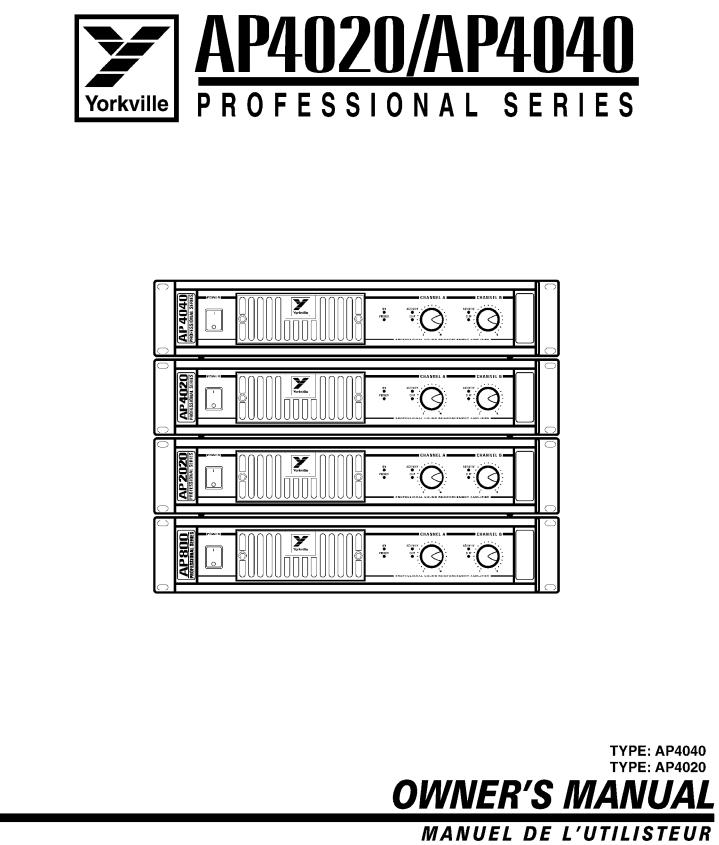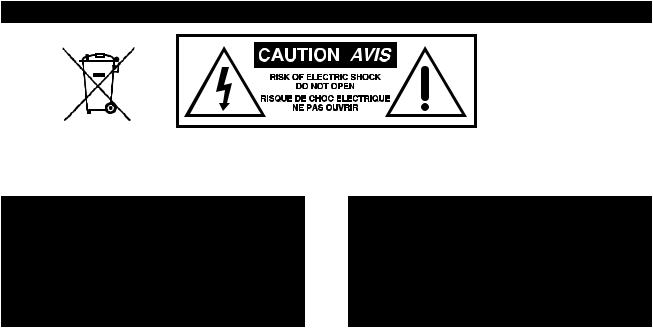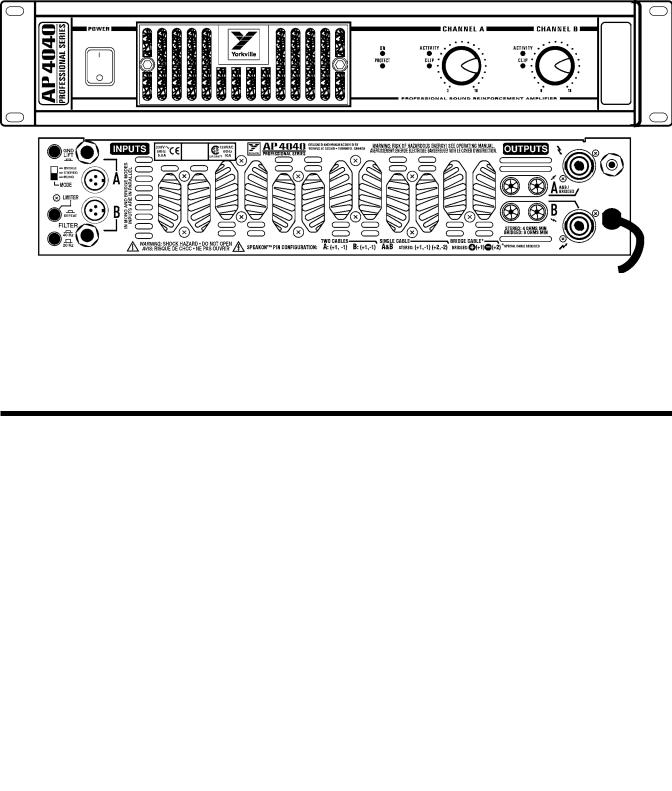Yorkville Sound AP4020, AP4040 User Manual


IMPORTANT SAFETY INSTRUCTIONS
INSTRUCTIONS PERTAINING TO A |
INSTRUCTIONS RELATIVES AU RISQUE |
RISK OF FIRE, ELECTRIC SHOCK, |
DE FEU, CHOC ÉLECTRIQUE, OU |
OR INJURY TO PERSONS |
BLESSURES AUX PERSONNES |
CAUTION:
TO REDUCE THE RISK OF ELECTRIC SHOCK, DO
NOT REMOVE COVER (OR BACK).
NO USER SERVICEABLE PARTS INSIDE.
REFER SERVICING TO QUALIFIED
SERVICE PERSONNEL.
Read Instructions
The Owner’s Manualshould be read and understood before operation of your unit. Please, save these instructions for future reference.
Packaging
Keep the box and packaging materials, in case the unit needs to be returned for service.
Warning
When using electric products, basic precautions should always be followed, including the following:
Power Sources
Your unit should be connected to a power source only of the voltage specified in the owners manual or as marked on the unit. This unit has a polarized plug. Do not use with an extension cord or receptacle unless the plug can be fully inserted. Precautions should be taken so that the grounding scheme on the unit is not defeated.
Hazards
Do not place this product on an unstable cart, stand, tripod, bracket or table. The product may fall, causing serious personal injury and serious damage to the product. Use only with cart, stand, tripod, bracket, or table recommended by the manufacturer or sold with the product. Follow the manufacturer’s instructions when installing the product and use mounting accessories recommended by the manufacturer.
The apparatus should not be exposed to dripping or splashing water; no objects filled with liquids should be placed on the apparatus.
Terminals marked with the “lightning bolt” are hazardous live; the external wiring connected to these terminals require installation by an instructed person or the use of ready made leads or cords.
No naked flame sources, such as lighted candles, should be placed on the apparatus.
Power Cord
The AC supply cord should be routed so that it is unlikely that it will be damaged. If the AC supply cord is damaged DO NOT OPERATE THE UNIT.
Service
The unit should be serviced only by qualified service personnel.
AVIS:
AFIN DE REDUIRE LES RISQUE DE CHOC ELECTRIQUE, N’ENLEVEZ PAS LE COUVERT (OU LE PANNEAU ARRIERE)
NE CONTIENT AUCUNE PIECE
REPARABLE PAR L’UTILISATEUR.
CONSULTEZ UN TECHNICIEN QUALIFIE
POUR L’ENTRETIENT
Veuillez Lire le Manuel
Il contient des informations qui devraient êtres comprises avant l’opération de votre appareil. Conservez S.V.P. ces instructions pour consultations ultérieures.
Emballage
Conservez la boite au cas ou l’appareil devait être retourner pour réparation.
Attention:
Lors de l’utilisation de produits électrique, assurez-vous d’adhérer à des précautions de bases incluant celle qui suivent:
Alimentation
L’appareil ne doit être branché qu’à une source d’alimentation correspondant au voltage spécifié dans le manuel ou tel qu’indiqué sur l’appareil. Cet appareil est équipé d’une prise d’alimentation polarisée. Ne pas utiliser cet appareil avec un cordon de raccordement à moins qu’il soit possible d’insérer complètement les trois lames. Des précautions doivent êtres prises afin d’eviter que le système de mise à la terre de l’appareil ne soit désengagé.
Risque
Ne pas placer cet appareil sur un chariot, un support, un trépied ou une table instables. L’appareil pourrait tomber et blesser quelqu’un ou subir des dommages importants. Utiliser seulement un chariot, un support, un trépied ou une table recommandés par le fabricant ou vendus avec le produit. Suivre les instructions du fabricant pour installer l’appareil et utiliser les accessoires recommandés par le fabricant.
Il convient de ne pas placer sur l’appareil de sources de flammes nues, telles que des bougies allumées.
L’appeil ne doit pas être exposé à des égouttements d’eau ou des éclaboussures et qu’aucun objet rempli de liquide tel que des vases ne doit être placé sur l’appareil.
Les dispositifs marqués d’une symbole “d’éclair” sont des parties dangereuses au toucher et que les câblages extérieurs connectés à ces dispositifs de connection extérieure doivent être effectivés par un opérateur formé ou en utilisant des cordons déjà préparés.
Cordon d’Alimentation
Évitez d’endommager le cordon d’alimentation. N’UTILISEZ PAS L’APPAREIL si le cordon d’alimentation est endommagé.
Service
Consultez un technicien qualifié pour l’entretien de votre appareil.
safety-4v1.eps Aug 26/05

Introduction
Your new Yorkville AP4020/4040 power amplifier is designed and built to provide years of trouble free performance. The AP4020/4040 combines the field proven reliability of our Audiopro amplifiers with customer requested features such as switchable limiters, a Mono/Stereo/Bridge switch, and SPEAKON™ output connectors as well as binding posts.
The AP4020/4040 weighs a comfortable but solid 42 pounds, fits into two rack spaces, and reproduces music with over 4000 Watts of headroom. It will drive reactive phase shifted loads with no difficulty - even though it is fully protected from accidental short circuits. Our design goal was to create an amplifier which would do exactly what an amplifier should do: reproduce music with great power, complete reliability, and uncompromising signal fidelity. We think you will agree that the Yorkville AP4020/4040does exactly that.
Inputs
Balanced Inputs
Either XLR or two–circuit ‘Ring, Tip, Sleeve’ Stereo 1/4-inch PHONE cords may be used. Each channel’s XLR input is internally paralleled with its phone input (The TIP of the channel ‘A’ PHONE input is connected to pin 2 of its XLR input, the RING is connected to pin 3, and the Sleeve is connected to PIN 1). PIN 2 is in phase, PIN 3 is 180 degrees out of phase, and PIN 1 is ground. We recommend using balanced lines for the best humfree performance, particularly when chaining multiple amplifiers.
Unbalanced Inputs
Ordinary single circuit Standard 1/4- inch PHONE plugs may be used to connect unbalanced signals. IMPORTANT NOTE: Such plugs effectively connect the ring terminal to sleeve ground, so they work correctly. However, if you use a Stereo 1/4-inch PHONE plug on an unbalanced line, you MUST short the Ring terminal to the sleeve terminal, oth erwise the sensitivity will be 6dB lower than is specified! (The same applies to the XLR input: To connect an unbalanced source via the XLR input, you must connect the signal to Pin 2 and ground BOTH Pin 1 and Pin 3).
Remote Referencing
You can approach balanced performance with unbalanced sources by utiliz
ing the remote reference feature of the AP4020/4040 . Connect a balanced cable to the AP4020/4040 just as you would if you were running a balanced line. At the other end, connect Pin 3 and Pin 1 together, (or connect ring to sleeve if you are using a PHONE plug cable), and plug this modified end into your unbalanced piece of equipment. This connection enables the AP4020/4040 ’s input to look down the cable directly at the output jack of the unbalanced equipment. Any hum voltage generated across the cable’s impedance will be attenuated by the common mode rejection of the AP4020/4040.
Driving Multiple AP4020/4040’s
In large installations it is often desirable to operate many amplifiers in tandem. Since each channel’s XLR input is internally paralleled with its phone input, you may use the remaining input jack as an output to the next amplifier. Obviously you will need both XLR to XLR and PHONE to PHONE patch cords if you are going to tandem more than two amplifiers.
NOTE: These patch cords MUST be balanced whether the or unbalanced!
Ground Switch
Switching the ground switch on rear panel will disconnect chasground from circuit ground. Safety earth) ground is still connected to the chassis. We do not recommend lifting ground strap unless you are experiencing problems with ground loop hum
multiple amplifier setups where lifting ground straps of all but one amplicures the hum problem.
CAUTION: Sometimes hum problems an indication of improper AC wirsomewhere else in your system.
Don’t just doctor the symptom by lifting grounds. Fix the cause by making sure the proper electrical wiring safety
regulations have been adhered to.
Modes
Mono Mode
• Channel A & B inputs are paralleled
• Each gain control adjusts the signal level for its respective channel
• Output signals are of equal phase.
• Two loads are driven.
• Loads are connected between the BLACK and RED post on each channel.
1

Stereo Mode
• Two independent amplifiers, Amp A and Amp B.
• Two loads are driven.
• Loads are connected between the BLACK and RED posts on each channel.
Bridge Mode
• Channel A & B inputs are paralleled. GAIN-B has no effect.
• Output signals are equal in amplitude but opposite in phase.
• One load is driven.
• The load is connected between the two RED binding posts. The BLACK posts are not used.
Subsonic Filter Switch
The AP4020/4040 features a specially designed subsonic filter which effectively blocks potentially destructive energy in the band below 40 Hz. The filter provides a 12 dB/octave. skirt below 40 Hz. It is implemented with a two pole network designed to minimize phase shift down to 40 Hz. We recommend using this filter in conjunction with some subwoofers and with all high power full range cabinets. With the filter disabled, the AP4020/4040 is flat down to 20-Hz, and rolls off at 12dB/Oct below that.
Limiter Switch
With the internal limiters activated, the AP4020/4040’s gain is continuously adjusted to fit the signal within the available dynamic range. Occasional clipping is permitted. The limiters will not only help to protect your system’s horns and tweeters, but will automatically make the best use of the available dynamic headroom. With the limiters activated, all you need to do is turn up the signal level until you start to see some clipping. The limiters will make sure that you are getting the maximum clean power output at all times. Setting the switch to the IN position completely disables both limiters.
Protect LED
In the event of a shorted load or a load which is of too low an impedance for the amplifier to handle the PROTECT LED will flash alternately on and off at about 3 second intervals.
The sound may come on and off at ½ second intervals. In this case, the fault is in the speakers or the speaker cables and should be located and remedied. No reset of the AP4020 /4040 is required to restore proper operation. The PROTECT LED will stay on if the amplifier has overheated. Check the speaker load impedance and any restrictions to air flow at the air intake or exhaust vents of the amplifier.
Short Circuit Protection
The AP4020/4040 is fully protected against all possible passive load conditions. It can operate into a dead short continuously without damage. (However, we don’t recommend that you short your AP4020/4040 “just for fun.” Shorts do create a lot of stress on the output devices). The output stage uses a unique triple slope VI-limiting scheme which is sophisticated enough to remain inert during transient currents in excess of 100 Amperes and phase angles of more than 45 degrees, yet is capable of protecting the output stage from damage due to accidental short circuits and improper loads.
DC Protection
In the unlikely event of the AP4020/4040’s outputs going DC, a thyristor circuit will short the output terminals and divert all potentially harmful currents away from your speakers.
Thermal Protection
In the unlikely event that the AP4020/4040 overheats, the signal will be sporadically cut off and the PROTECT LED will stay on. The AP4020/4040 is designed and tested to operate under “worst case” conditions without shutting down, so if you experience a thermal shut down you should check for blocked air flow.
Cooling
The fan draws air in from the front and expels hot air through the rear vents. This is compatible with most installations. Since hot air rises, the heated air forcibly expelled from the back tends to rise away from the equipment rack. This draws cool air from the floor upwards into the front of the rack. In some cases where the rear of the rack is obstructed, it may be necessary to install rack fans to aid cooling. If there are no obstructions, no secondary cooling is required.
Fan Filter Maintenance
The AP4020/4040 is factory equipped with a fan filter mounted on the air-intake grill located on the amplifier’s front panel. Regular cleaning of this filter will increase the amplifier’s long term reliability. The filter should be removed and washed at the first sign of visible clogging. This will typically occur every four to six weeks depending on use and environment. Replacement filters are inexpensive and can be ordered through Yorkville dealers. The foam filter should be removed if a regular inspection schedule is not going to be followed. The amplifier can operate without the filter in place, but the amplifier should be cleaned internally by a qualified service technician when dust is visible on the heatsink fins.
Note: In an unusually dusty location, without regular filter inspections, removing the foam filter can extend the operating time before thermal shutdown could occur. At that time, the internal heatsinks should be cleaned thoroughly.
Clip LEDs
The CLIP LEDS on the front panel will visibly indicate any signal excursion beyond the dynamic headroom of the amplifier.
Reliability
The AP4020/4040 is designed and manufactured by Yorkville Sound. Each unit undergoes a thorough, temperature cycled burn-in period, and each circuit is tested by both manual and sophisticated computer controlled equipment
CAUTION: The AP4020/4040 can deliver over 2400 Watts of power into a bridged load. Yorkville’s own high power speaker systems have circuit-breaker protection built in. Although these speakers will protect themselves, they are unlikely to be damaged by
a bridged AP4020/4040 . However, many other speaker manufacturers make “high power cabinets” with no protection features at all.
Yorkville Sound is not responsible for any damage which may result as a consequence of exceeding such a speaker’s power handling capability. Yorkville’s Two Year Unconditional Warranty does not cover any consequential damages to non-Yorkville equipment. Please consider these facts carefully before you choose to run your AP4020/AP4040 in Bridge Mode!
2
which is capable of identifying any deviation from the design center parameters. The design of the AP4020/4040 is conservative with respect to the power handling capabilities of the output devices. The topology guarantees that thermal stress not secondary breakdown will set the limits of operation, while the computer optimized heat dissipation system insures that excessive thermal stress will not occur. Yorkville’s reputation as a manufacturer of reliable equipment will be further enhanced by the AP4020/4040.
The AP4020/4040 is not only suitable for use in both heavy duty touring sound reinforcement systems but also when high headroom and low distortion are needed to fully reproduce the dynamic range and clarity of today’s CD recordings. It is built to survive grueling road conditions and constant 2 ohm (4 ohm in the AP4040) operation. Its reliability in a fixed installation running 4 or 8 ohm studio monitors is without parallel.
Output Connections
WARNING: When driven to full power in Bridge Mode. There is more than 100Vrms appearing between the binding posts. This represents a significant shock hazard and due care should be taken when making any speaker connections. Ensure that no strands of bare conductor are exposed after inserting the speaker wire into the hole in the side of the binding post terminals.
The AP4020/4040 has 5–way binding posts and Neutrik four contact Speakon™ connectors for output speaker connections. Connection to the binding posts can either be made with a banana plug inserted into the end of the post.
There are two Speakon™ connectors. The Speakons™ are connected to the amplifier’s outputs whether the amplifier is in stereo, mono, or bridge modes. Each Speakon™ output connector (output A and output B) is wired in parallel with it’s respective binding posts for two channel two cable connections (figure 1).
Speakon™ output A also doubles as the A&B/Bridge connector. This Speakon™ contains both channels on one connector. This is convenient when connecting one speaker to the amplifier in bridge mode where the speaker is connected across the positives of each amplifier output. Configure the mode switch for bridge and connect the speaker to pins +1 and +2 of the bridge/bi-amp Speakon (figure 3).
To connect a bi-amp speaker, configure the amplifier for stereo and connect to the bridge/bi-amp connector but use all four terminals in the Speakon connector which will connect A and B outputs separately to the speaker (figure 2). Connection configurations are labeled on the back panel.
Power Output
All values are in WATTS. Measurements were made at the 0.1% distortion point. Some CONTINUOUS AVERAGE POWER measurements required line currents greater than 15 Amps. The amplifier under test was plugged into an IDEAL POWER LINE consisting of a REGULATED 120 VAC RMS 60 Hz pure sine wave. Ordinary AC “wall outlet” lines will always exhibit varying and unpredictable amounts of sag. To produce objectively verifiable and accurate specifications these unknown factors must be eliminated by using an ideal AC line. When using an ordinary electrical outlet, it will usually be possible to get 2400 Watts when the AP4020 is bridged into 4 ohms (AP4040 bridges at 8 ohms). The BURST measurements use a 10mS burst at 1KHz with a 1/8 second pause between bursts. The 1KHz burst represents the maximum possible sine wave output power.
|
AP4020 |
|
AP4040 |
|
Both Channels Driven |
|
|
|
|
Load |
1KHz |
1KHz |
1KHz |
1KHz |
(ohms) |
Cont. Avg. |
Burst |
Cont. Avg. |
Burst |
|
2 ohm Mode |
2 ohm Mode |
4 ohm Mode |
4 ohm Mode |
8 |
475 |
625 |
750 |
1200 |
4 |
750 |
1200 |
1200 |
2175 |
2 |
1200 |
2175 |
n/a |
n/a |
Bridge Mode |
|
|
|
|
Load |
1KHz |
1KHz |
1KHz |
1KHz |
(ohms) |
Cont. Avg. |
Burst |
Cont. Avg. |
Burst |
|
2 ohm Mode |
2 ohm Mode |
4 ohm Mode |
4 ohm Mode |
8 |
1500 |
2400 |
2400 |
4350 |
4 |
2400 |
4350 |
n/a |
n/a |
2 |
n/a |
n/a |
n/a |
n/a |
3
